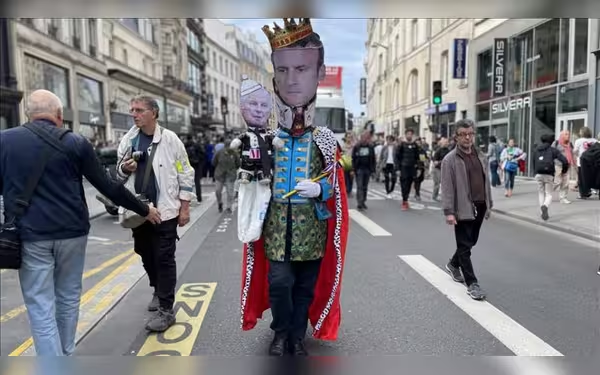Saturday, November 16, 2024 05:33 PM
France Protests Demand Macron's Resignation Amid Political Turmoil
- Thousands protest against Macron's government decisions.
- Demonstrators call for accountability and social reforms.
- Activists highlight disconnect between government and citizens.
 Image Credits: nation_pk
Image Credits: nation_pkThousands protest in France demanding Macron's resignation, highlighting discontent with government decisions and calls for social reforms.
In recent days, France has witnessed a wave of protests as thousands of citizens took to the streets in major cities like Paris, Lyon, and Marseille. The demonstrations were sparked by widespread dissatisfaction with President Emmanuel Macron's decision to appoint centrist-right politician Michel Barnier as prime minister, bypassing the left-wing coalition's candidate, Lucie Castets. This move has ignited anger among many who feel that Macron is ignoring the will of the people, particularly the results of the recent general elections won by the New Popular Front (NFP), a left-green alliance.
Protesters have been vocal in their demands, calling for Macron's resignation and impeachment. They have collected signatures to push for his removal before the end of his term in 2027. The atmosphere during the protests was charged, with demonstrators not only expressing their discontent with the government but also advocating for important social issues such as raising the minimum wage and lowering the retirement age. These demands reflect a broader concern about economic conditions and the cost of living in France.
Among the protesters were activists from New Caledonia, who highlighted the struggles faced in the French overseas territory, particularly the high cost of living. One young activist, Laly, aged 23, shared her frustrations, stating, "We're struggling to convince people to vote each time, to explain the real importance of voting." Her words underscore a significant issue: the perceived disconnect between the government and the electorate, which many believe threatens the very foundation of democracy.
The protests were not just limited to ordinary citizens; they also saw participation from members of parliament, activists, and supporters of Palestine, showcasing a united front against what they view as an undemocratic approach by the current administration. The diverse group of protesters reflects a growing sentiment among the French populace that their voices are not being heard.
As the situation unfolds, it is clear that the protests are more than just a reaction to a political appointment; they represent a deeper yearning for accountability and responsiveness from elected officials. The ongoing demonstrations serve as a reminder of the power of collective action and the importance of civic engagement in shaping the future of democracy in France. As citizens continue to rally for their rights and demands, the question remains: will the government listen, or will the protests escalate further?













